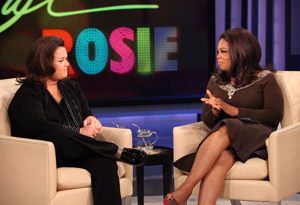Rosie O'Donnell on Life, Love and Family

PAGE 6
Though Rosie says she's always wanted to be a mom, she was fearful of what would happen once her children reached age 10—the age she was when her mother died. "For a long time, I had been telling myself: 'Well, I was not parented after the age of 10. I'm not going to know what to do when they get older than 10,'" she says.
Looking back, Rosie realizes she's been wrong all along. After her mother died and her father was too grief-stricken to care for his children, Rosie says women who lived in her Long Island neighborhood stepped in as surrogate mothers.
"I was raised with love, compassion and grace by women who were not connected to me by biological means, and that's exactly what I ended up doing," she says.
From age 10 until her freshman year in college, Rosie says she never spoke of her mother's death. In response, Rosie's parenting style is the opposite of her father's. In her home, every child is encouraged to share his or her feelings. "In fact, it's to the point that it almost annoys my children now," she says. "I'm constantly saying: 'Are you okay? What are you feeling? Can we talk?'"
Looking back, Rosie realizes she's been wrong all along. After her mother died and her father was too grief-stricken to care for his children, Rosie says women who lived in her Long Island neighborhood stepped in as surrogate mothers.
"I was raised with love, compassion and grace by women who were not connected to me by biological means, and that's exactly what I ended up doing," she says.
From age 10 until her freshman year in college, Rosie says she never spoke of her mother's death. In response, Rosie's parenting style is the opposite of her father's. In her home, every child is encouraged to share his or her feelings. "In fact, it's to the point that it almost annoys my children now," she says. "I'm constantly saying: 'Are you okay? What are you feeling? Can we talk?'"



